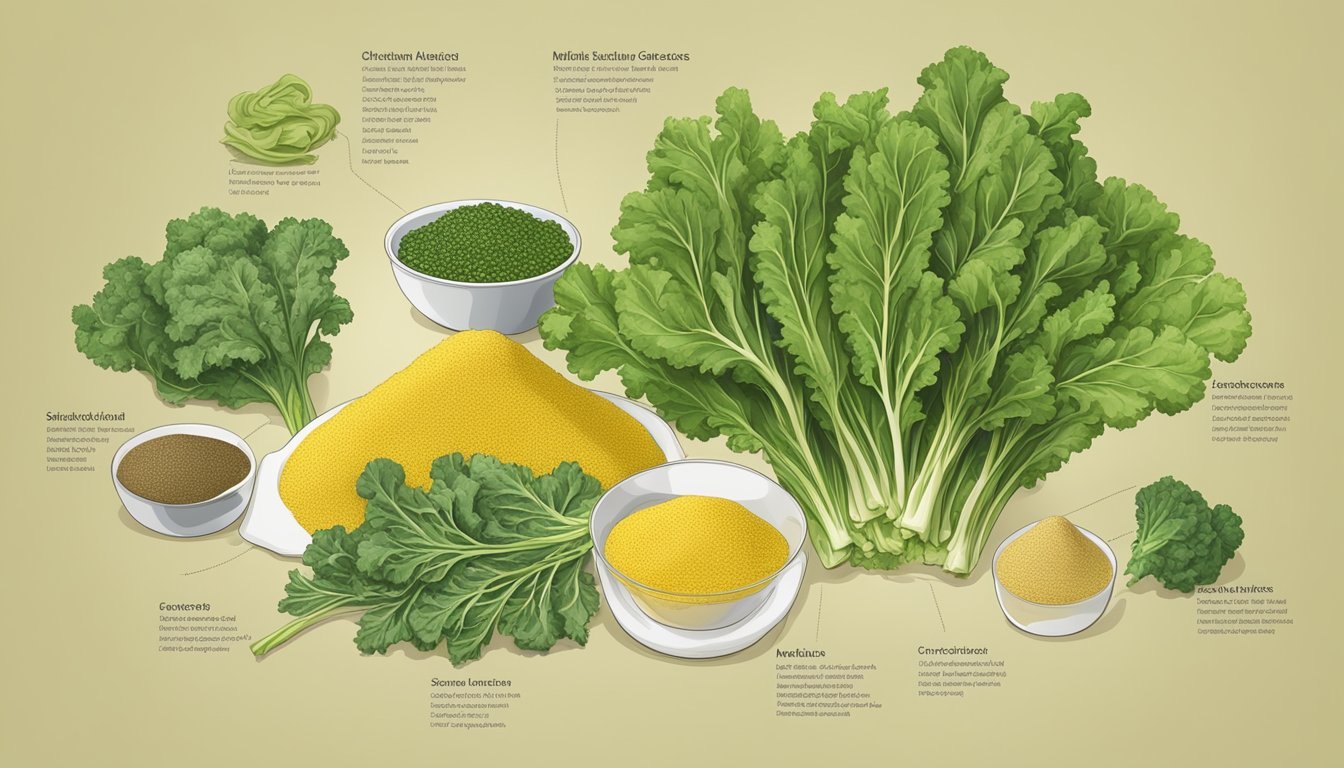What Are the Health Benefits of Mustard Greens?
Unveiling Nutritional Advantages
Mustard greens are leafy vegetables deriving from the mustard plant, known for their slightly peppery taste. Rich in essential nutrients, they boast a range of health benefits that make them a valuable addition to a balanced diet. These greens are packed with powerful antioxidants, vitamins, and minerals that support overall health.
The nutritional profile of mustard greens includes high levels of vitamins A, C, and K, all of which play pivotal roles in maintaining the body's functions. Vitamin A is critical for healthy vision and skin, while vitamin C supports the immune system and acts as an antioxidant. Most notably, vitamin K is important for blood clotting and bone health, with a single serving of cooked mustard greens providing well over the daily recommended amount.
Furthermore, the greens are a great source of dietary fiber, which aids in digestion and contributes to cardiovascular health. The presence of antioxidants such as beta carotene helps protect the skin and may lower the risk of chronic diseases, such as diabetes. Including mustard greens in one's diet is not only a flavorful choice but also a step towards fortifying the body's health.
Nutritional Profile of Mustard Greens
Mustard greens offer a wealth of nutrients; from an abundance of vitamins and minerals to being a good source of dietary fiber and protein, these leafy greens are a nutritional powerhouse in a low-calorie package.
Vitamins and Minerals
Mustard greens are particularly rich in vitamins A, C, and K. In fact, a cup of cooked mustard greens can provide over 96% of the Daily Value (DV) for vitamin A and an impressive 690% of the DV for vitamin K. These greens are also a good source of vitamin C, calcium, potassium, and magnesium, essential nutrients for various bodily functions. The mineral content in mustard greens includes trace amounts of zinc, iron, copper, and manganese, which play vital roles in immune function, red blood cell formation, and bone health.
Vitamin A: Vital for vision, immune system, and skin health
Vitamin K: Crucial for blood clotting and bone mineralization
Vitamin C: Important for immune defense and skin health
Calcium: Necessary for bone health and muscular functions
Potassium: Regulates fluid balance and blood pressure
Magnesium: Supports muscle and nerve function
Fiber and Protein Content
Fiber is an essential part of a healthy diet, and mustard greens provide it in generous amounts, aiding in digestion and providing a sense of fullness. With respect to protein, mustard greens offer a modest amount, making them an excellent choice for those looking to increase their intake of plant-based proteins. This combination of fiber and protein helps in promoting satiety and can be a beneficial factor in weight management.
Fiber: Helps with digestive health and satiety
Protein: Supports muscle repair and growth
By incorporating mustard greens into one's diet, they can take advantage of the numerous health benefits these nutrient-dense vegetables provide.
Health Benefits
Mustard greens are celebrated for their nutritional richness and health-promoting properties, with a particular ability to support cardiovascular and bone health, offer protection against certain cancers, maintain eye health, and aid in weight management and digestion.
Cardiovascular Health
Mustard greens can contribute to improved heart health. They are rich in antioxidants that can help lower the risk of heart disease by combating oxidative stress. The greens also contain compounds called glucosinolates, which have been linked to a reduced risk of arterial diseases. Additionally, the high levels of vitamins in mustard greens work to regulate cholesterol levels and maintain healthy blood flow and clotting.
Bone Health
High in calcium, these leafy greens play a critical role in preventing osteoporosis and maintaining bone strength. Mustard greens are also an excellent source of vitamin K, an essential nutrient for bone mineralization and normal blood clotting processes.
Cancer Prevention
The glucosinolates found in mustard greens are known for their potential cancer-fighting abilities. They may protect against the formation of cancer cells, with an efficacy noted particularly in cases linked to the digestive tract. Furthermore, mustard greens’ high antioxidant content aids in reducing oxidative stress and combats the proliferation of free radicals that can lead to cancer.
Eye Health
Mustard greens are a good source of lutein and zeaxanthin, two potent carotenoids that are beneficial for eye health. These components help protect the eyes from sunlight damage and decreased the risk of cataracts and age-related macular degeneration.
Weight Management and Digestion
Low in calories and high in fiber, mustard greens support weight management by promoting a feeling of fullness and reducing overall calorie intake. The dietary fiber in mustard greens is also beneficial for the digestive system, enhancing intestinal health and metabolism.
Culinary Uses and Preparation
Mustard greens are versatile in the kitchen, commonly used both in raw and cooked forms due to their peppery taste, which can add a spicy flavor to various dishes. They are a member of the Brassica family, sharing traits with kale, cabbage, broccoli, and cauliflower.
Raw and Cooked Preparations
Raw Preparations:
Salads: Chopped mustard greens can be added to salads for a peppery kick, often mixed with lettuce or spinach to balance the bitterness.
Smoothies: For a detox boost, raw leaves are sometimes blended into smoothies with fruits and other vegetables.
Cooked Preparations:
Sautéing: Mustard greens can be sautéed with garlic and olive oil, then finished with a splash of vinegar or lemon juice to soften their spicy flavor.
Soups and Stews: They can be incorporated into soups and stews; their sturdy texture holds up well during cooking.
Braising: Cooking mustard greens slowly with a small amount of liquid brings out a tender texture while reducing their bitter taste.
Mustard Seeds and Condiments
Mustard Seeds:
Brown Mustard (Brassica juncea): Often used in Indian cooking, these seeds offer a spicy, sharp taste.
Yellow Mustard (Sinapis alba): The mild seeds are used to make the classic yellow mustard condiment.
Condiments:
Prepared Mustards: Mustard seeds are ground and mixed with vinegar, water, and seasonings to produce a variety of condiments, from smooth and mild to spicy and coarse.
Pickling: The seeds can be used in pickling brines for vegetables like cucumbers or cauliflower, imparting a tangy, spicy flavor.
Potential Risks and Considerations
While mustard greens offer numerous health benefits, such as antioxidants that combat free radicals and may slow aging, they also contain oxalates. High concentrations of oxalates can contribute to the formation of kidney stones in susceptible individuals.
Oxidative stress, a factor in diseases such as Alzheimer’s and arthritis, is combatted by the antioxidants present in mustard greens. However, excessive consumption should be avoided, especially by those with a predisposition to or history of kidney stones.
People taking anticoagulant medications need to monitor their vitamin K intake, which is abundant in mustard greens, as it can affect the blood's clotting abilities. A sudden increase in vitamin K can counteract the medication's effectiveness.
Oxalate Content: High oxalate foods can increase the risk of kidney stones.
Vitamin K Levels: Large amounts of vitamin K can interfere with anticoagulants.
Allergic Reactions: Rare, but possible, especially in individuals sensitive to greens in the Brassica family.
Mustard greens should be introduced gradually into the diet to assess individual tolerance. Remember, balanced consumption is key; they should be a part of a varied diet to avoid potential risks associated with overconsumption.
Frequently Asked Questions
The health benefits of mustard greens stem from their rich nutritional profile, and they can be a valuable asset to a diet. Below are some of the common questions asked about the consumption and effects of mustard greens.
What are the potential side effects of consuming mustard greens?
Individuals with certain health conditions may need to be cautious. For instance, those with thyroid issues should know that mustard greens contain goitrogens, which could interfere with thyroid hormone synthesis. Additionally, the high vitamin K content may affect blood clotting, so those on blood thinners should consult with their healthcare provider.
How do the nutritional contents of mustard greens contribute to their health benefits?
Mustard greens are a powerhouse of vitamins and minerals. They are particularly high in vitamin K, which is crucial for bone health, and vitamin C, an antioxidant that supports the immune system. Their fiber content promotes digestive health, while other nutrients within may aid in managing blood glucose and providing protective antioxidants.
What are some common ways to incorporate mustard greens into a diet?
They can be enjoyed raw in salads, which adds a peppery taste, or cooked, which mellows their bite. Mustard greens work well in a range of dishes such as stews, soups, and casseroles, and they pair nicely with proteins like chicken or fish.
Can mustard greens play a role in a weight loss diet plan?
Their low calorie and high fiber content make mustard greens an excellent choice for weight loss diets. Fiber helps one feel full, which can reduce overall caloric intake. Additionally, their nutrient density means they provide vital vitamins and minerals without adding excess calories.
In what ways might mustard greens reduce inflammation in the body?
Mustard greens contain antioxidants like beta carotene and vitamin C, which can help protect cells from damage and reduce inflammation. Their anti-inflammatory properties may contribute to reducing the risk of chronic diseases associated with inflammation.
How do mustard greens compare to collard greens in terms of nutritional value and health benefits?
While both are nutritious, mustard greens have a slightly higher vitamin K content compared to collard greens, beneficial for bone health. Meanwhile, collard greens may have a more muted flavor that some find more palatable, but mustard greens might offer more antioxidants per serving due to their peppery leaves.





